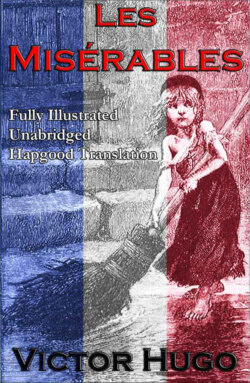Читать книгу Les Miserables (Fully Illustrated Unabridged Hapgood Translation) - Victor Hugo - Страница 37
На сайте Литреса книга снята с продажи.
ОглавлениеIt was because,—strange phenomenon, and one which was possible only in the situation in which he found himself,—in stealing the money from that child, he had done a thing of which he was no longer capable.
However that may be, this last evil action had a decisive effect on him; it abruptly traversed that chaos which he bore in his mind, and dispersed it, placed on one side the thick obscurity, and on the other the light, and acted on his soul, in the state in which it then was, as certain chemical reagents act upon a troubled mixture by precipitating one element and clarifying the other.
First of all, even before examining himself and reflecting, all bewildered, like one who seeks to save himself, he tried to find the child in order to return his money to him; then, when he recognized the fact that this was impossible, he halted in despair. At the moment when he exclaimed “I am a wretch!” he had just perceived what he was, and he was already separated from himself to such a degree, that he seemed to himself to be no longer anything more than a phantom, and as if he had, there before him, in flesh and blood, the hideous galley-convict, Jean Valjean, cudgel in hand, his blouse on his hips, his knapsack filled with stolen objects on his back, with his resolute and gloomy visage, with his thoughts filled with abominable projects.
Excess of unhappiness had, as we have remarked, made him in some sort a visionary. This, then, was in the nature of a vision. He actually saw that Jean Valjean, that sinister face, before him. He had almost reached the point of asking himself who that man was, and he was horrified by him.
His brain was going through one of those violent and yet perfectly calm moments in which revery is so profound that it absorbs reality. One no longer beholds the object which one has before one, and one sees, as though apart from one’s self, the figures which one has in one’s own mind.
Thus he contemplated himself, so to speak, face to face, and at the same time, athwart this hallucination, he perceived in a mysterious depth a sort of light which he at first took for a torch. On scrutinizing this light which appeared to his conscience with more attention, he recognized the fact that it possessed a human form and that this torch was the Bishop.
His conscience weighed in turn these two men thus placed before it,—the Bishop and Jean Valjean. Nothing less than the first was required to soften the second. By one of those singular effects, which are peculiar to this sort of ecstasies, in proportion as his revery continued, as the Bishop grew great and resplendent in his eyes, so did Jean Valjean grow less and vanish. After a certain time he was no longer anything more than a shade. All at once he disappeared. The Bishop alone remained; he filled the whole soul of this wretched man with a magnificent radiance.
Jean Valjean wept for a long time. He wept burning tears, he sobbed with more weakness than a woman, with more fright than a child.
As he wept, daylight penetrated more and more clearly into his soul; an extraordinary light; a light at once ravishing and terrible. His past life, his first fault, his long expiation, his external brutishness, his internal hardness, his dismissal to liberty, rejoicing in manifold plans of vengeance, what had happened to him at the Bishop’s, the last thing that he had done, that theft of forty sous from a child, a crime all the more cowardly, and all the more monstrous since it had come after the Bishop’s pardon,—all this recurred to his mind and appeared clearly to him, but with a clearness which he had never hitherto witnessed. He examined his life, and it seemed horrible to him; his soul, and it seemed frightful to him. In the meantime a gentle light rested over this life and this soul. It seemed to him that he beheld Satan by the light of Paradise.
How many hours did he weep thus? What did he do after he had wept? Whither did he go! No one ever knew. The only thing which seems to be authenticated is that that same night the carrier who served Grenoble at that epoch, and who arrived at D—— about three o’clock in the morning, saw, as he traversed the street in which the Bishop’s residence was situated, a man in the attitude of prayer, kneeling on the pavement in the shadow, in front of the door of Monseigneur Welcome.
